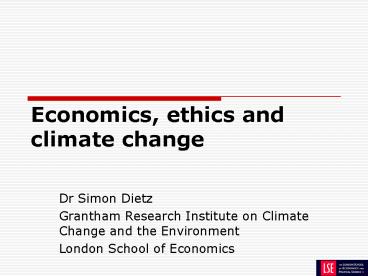Economics, ethics and climate change
1 / 9
Title:
Economics, ethics and climate change
Description:
Climate change has catastrophe potential, and market returns don't reflect that ... public-sector discount rates typically don't deal with climate catastrophes ... – PowerPoint PPT presentation
Number of Views:24
Avg rating:3.0/5.0
Title: Economics, ethics and climate change
1
Economics, ethics and climate change
- Dr Simon Dietz
- Grantham Research Institute on Climate Change and
the Environment - London School of Economics
2
Main point economics and ethics cut both ways
- Careful, explicit examination of ethical issues
can guide economic analysis (i.e. markets dont
provide a technocratic solution) - Economic analysis can provide guidance on ethical
issues by clarifying the consequences of
particular ethical viewpoints
3
A sketch of the controversy about the Stern Review
- The conclusion of the Review strong and
immediate action to reduce greenhouse gas
emissions is thought to depend on the discount
rate applied (partly true) - Ramsey formula for the social discount rate
- d is the rate of pure time preference or utility
discount rate - ? is the elasticity of the (social) marginal
utility of consumption, a measure of inequality
aversion - In Stern, d 0, ? 1, g 1.3 per year (net of
climate change), so r 1.4 per year - Others have set d and ? so that r 5 per year
or more
4
Descriptive versus prescriptive
- This is an old (and slightly repetitive) debate
between two standpoints - A descriptive approach
- d and ? must be consistent with peoples
preferences, as revealed in todays market place - And/or d and ? must be consistent with public
sector discount rates - A prescriptive approach
- Make direct and basic ethical judgements on d and
? - Could point in either direction, but is often to
used to argue in particular for low d
5
The problem with using market data to reveal
ethics
- Market prices ? social valuations (this is
actually the ultimate irony) - Wealth affects market behaviour
- Markets dont cover climate-change time scales
- Consumer choices ? social choices
- Climate change has catastrophe potential, and
market returns dont reflect that
6
The problem with revealed ethics as a whole
- Must make four assumptions about your data
- A unique preference is revealed by the observed
behaviour - The preferences revealed are true preferences,
based on full and correct information without any
errors in decision-making - The preferences measured are contextually
relevant to the ethical judgement at hand - The preferences are appropriate for social
decision making, and not merely individual
decision making
7
The argument for policy consistency
- Dont distort public investment to less
productive ends - Local difficulties
- Wide variation in public-sector discount rates
reflects many institutional factors - Some evidence on social rate of time preference
suggests it is much lower than public-sector
discount rates - Fundamental considerations
- Longer time horizon?
- Quite possible to immiserate future generations,
because regular public-sector discount rates
typically dont deal with climate catastrophes
8
So is climate change a special case?
- There seem to be two alternative resolutions to
this particular (narrow) debate - Both of which afford climate change special
status - Go back to first principles in setting the values
of ethical parameters - Set them consistent with other policies (i.e.
higher discounting), but add a side constraint to
ensure sustainability - Question does it make any difference? (I hope to
be able to tell you soon)
9
Economics, ethics and climate change
- Dr Simon Dietz
- Grantham Research Institute on Climate Change and
the Environment - London School of Economics































